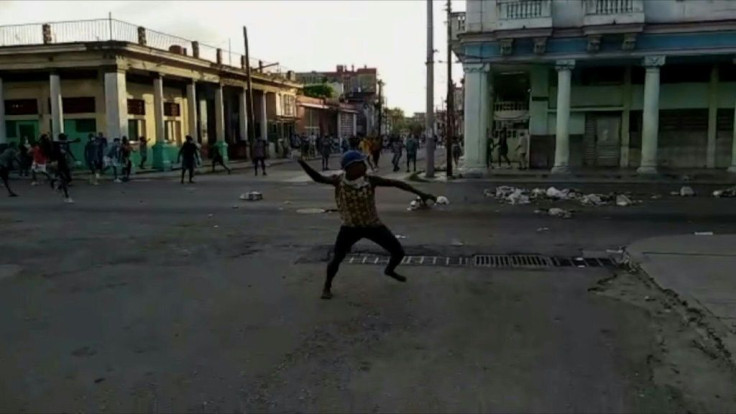Cuba Protests: Infamous Black Berets Deployed As Massive Protests Rock Regime
KEY POINTS
- Cuban government deploys police and Black Berets in Havana
- Cuba saw widespread protests Sunday, with calls to the president to step down
- The island country has been suffering from an economic crisis fueled further by the pandemic
- Shortage of food, medicine and other staples have been reported
Cuba's communist government has sent large numbers of police along with its infamous special agents called “Black Berets” to the streets in the capital Havana following a weekend of massive unrest.
Noticias Telemundo confirmed videos broadcast on social media networks that showed the Black Berets using violence to detain peaceful protesters, NBC reported. Sending the elite group of the Revolutionary Armed Forces, popularly known as “Black Berets,” to the streets is seen as a sign of how big the protests are and the government's determination to suppress them with force.
Cuban President Miguel Díaz-Canel appeared on national television to give authority to the Cuban Army, which includes the elite Black Berets, to suppress what could be the biggest protests yet in the island country in decades. He branded the peaceful protests prompted by misery and shortages as "provocations."
Díaz-Canel called on “all the revolutionaries in the country, all the communists” to go around Cuba, “where these provocations are going to take place.”
The Associated Press reported that a huge number of young people joined the protests across Havana on Sunday. On the same day, more than a dozen protesters were taken into custody as the demonstrations disrupted traffic.
Thousands take to the streets in Cuba to protest the government’s handling of both coronavirus and the economyhttps://t.co/kyr0hzXvd4 pic.twitter.com/YBHaFxIM1v
— BBC News (World) (@BBCWorld) July 12, 2021
The following day, police were dispatched to patrol around the capital.
It was difficult to determine the exact number of detained protesters due to disruptions in internet connectivity that raised questions on whether the Cuban government has tried to disrupt communications and prevent media reports about the protests from reaching the people.
London-based internet monitoring firm NetBlocks said multiple social networks and messaging apps were being blocked, including Facebook, Instagram and Telegram.
As Cubans took to the streets to protest the country's worst economic crisis in decades, authorities blocked social media sites. It's a tried-and-true method of stifling dissent by authoritarian regimes around the world. https://t.co/CoYRgb9oHi
— The Associated Press (@AP) July 13, 2021
Meanwhile, Díaz-Canel blamed U.S. sanctions for the economic crisis in Cuba that spurred the protests. “What is their origin, what is their cause? It is the blockade,” the Cuban leader said. He said the protests were fueled by a social media drive and manipulation by the United States.
U.S. President Joe Biden has since called on the Cuban government to “hear their people and serve their needs,” CNN reported.
On Monday, Biden said in a statement that his administration stands “with the Cuban people and their clarion call for freedom.”
We stand with the Cuban people as they bravely assert their fundamental and universal rights, and as they all call for freedom and relief from the tragic grip of the pandemic and from the decades of repression and economic suffering. https://t.co/KGY3MFfsw0
— President Biden (@POTUS) July 12, 2021
Biden noted that the protests were a symbol of the Cuban people’s assertion of “fundamental universal rights.”
White House press secretary Jen Psaki has said that the White House is considering how it can help the people of Cuba “directly” as the pandemic fanned the flames of a devastating economic crisis.
Protesters called for Díaz-Canel to step down as shortages of food, medicine, and other necessities increased across the island country. The New York Times reported that Cubans who had foreign currency in hand still had to wait in line to purchase rice and other food staples.
Power cuts also added to the suffering of the Cuban people.

© Copyright IBTimes 2025. All rights reserved.






















